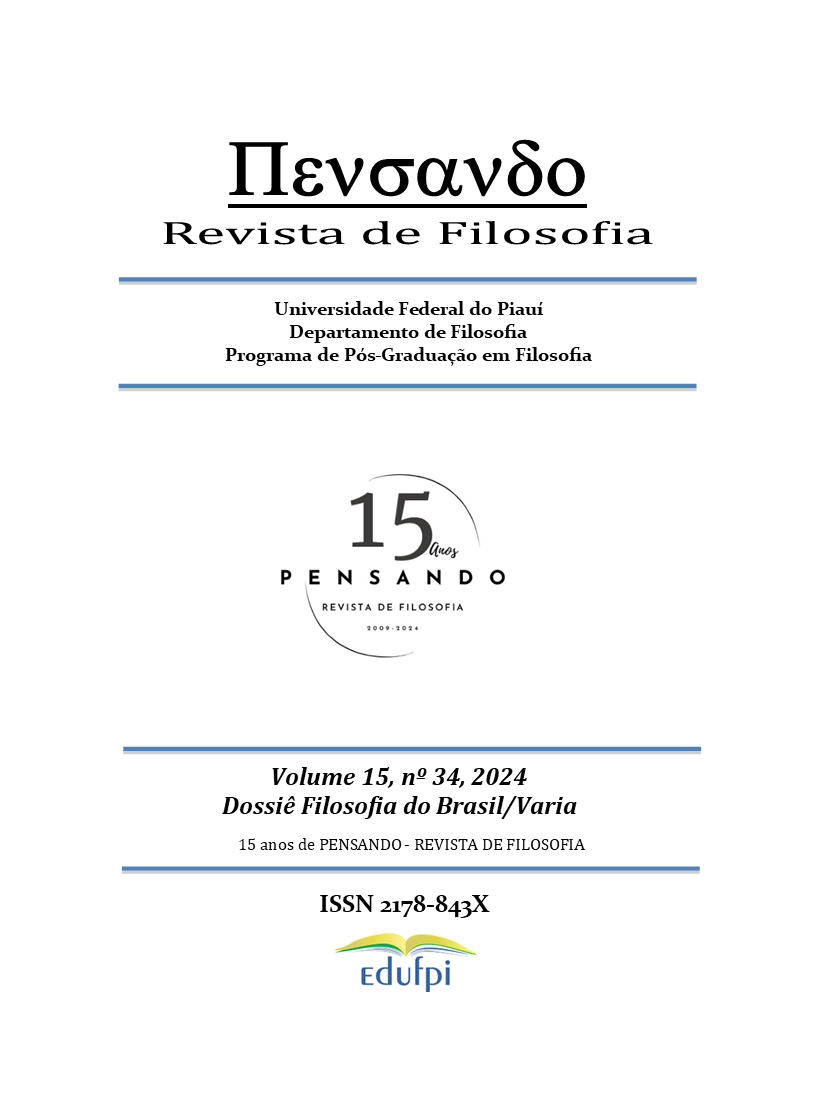Critical Thinking as Applied Epistemology
Realocando o pensamento crítico no panorama filosófico
DOI:
https://doi.org/10.26694/pensando.vol15i34.5952Keywords:
Applied Epistemology, Critical Thinking, Informal LogicAbstract
This is a portuguese translation of the article Critical Thinking as Applied Epistemology by epistemologist Mark E. Battersby. It is one of the founding articles of the epistemologically motivated approach to critical thinking. It made contributions that were unprecedented at the time and are necessary today, encouraging not only the foundation of subdisciplines of epistemology, but above all correctly encouraging that Critical Thinking is not just about mere instruction and pedagogical-cognitive correction, but consists of a project to apply epistemological norms to our everyday epistemic activities, whose correct name would be Applied Epistemology. He begins by arguing by analogy, explaining how Moral Philosophy has been reconfigured in the last century in terms of normative ethics, metaethics and applied ethics, showing that the same has happened with Epistemology in recent decades. Finally, it reveals the epistemology underlying theories of critical thinking to argue that they consist of a significant endeavour to offer answers to common questions about what we should believe and how we should believe what we believe.
References
ALSTON, William P. Meta-Ethics and Meta-Epistemology. In: GOLDMAN, A. I; KIM, J. Values and Morals. Dordbrecht: D. Reidel Publishing, 1978. p. 275-297.
AUSTIN, J. L. Other Minds. In: URMSON, J; WARNOCK, G (Orgs). Philosophical Papers, Oxford: Oxford University Press, 1979. p. 77-116.
BATTERSBY, Mark. Assessing Expert Claims: Critical Thinking and the Appeal to Authority. In: Proceedings Montclair College Conference on Critical Thinking. New Jersey: Montclair State College, 1988.
BAILIN, Sharon. Creative and Critical Thinking. Informal Logic, v.9, n.1, p. 23-30, 1987.
BRANDT, Richard. Epistemology and Ethics, Parallel Between. In: EDWARDS, Paul. The Encyclopedia of Philosophy. New York: Macmillan, 1967. p. 6-8.
FRANKENA, William. Ethics. New Jersey: Prentice-Hall, 1973.
GIERE, Ronald. Understanding Scientific Reasoning. New York: Rinehart, 1984.
GOVIER, Trudy. Selected Issues in Logic and Communication. Belmont: Wadsworth, 1987.
HARDWIG, John. Epistemic Dependence. Journal of Philosophy, v.82, n.7, p.335-349. 1985.
HUME, David. Enquiry Concerning Human Understanding, 1748.
JAMES, William. The Will to Believe and Other Essays in Popular Philosophy. New York: Longmans, 1896.
MCPECK, John E. Critical Thinking and Education. Oxford: Martin Robertson, 1981.
POLANYI, Michael; Harry Prosch. Meaning. Chicago: University of Chicago Press, 1975.
RAWLS, John. A Theory of Justice. Cambridge: Harvard University Press, 1971.
SIEGEL, Harvey S. Educating Reason: Critical Thinking, Informal Logic and the Philosophy of Education. Informal Logic, v.7, n. 2/3, p. 69-83, 1985.
______. Educating Reason: Rationality, Critical Thinking, and Education. New York: Routledge, 1988.
THOMSON, Judith J. A Defense of Abortion, Philosophy and Public Affairs, v. 1, p. 47-64, 1971.
WEDDLE, Perry. Fact from Opinion, Informal Logic, v.7, n.1, p.19-26, 1985.
Published
How to Cite
Issue
Section
License
Copyright (c) 2024 PENSANDO - REVISTA DE FILOSOFIA

This work is licensed under a Creative Commons Attribution 4.0 International License.

























